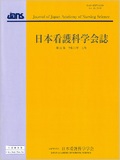Japanese
English
- 販売していません
- Abstract 文献概要
- 参考文献 Reference
要旨
目的:都市部の支援付き宿泊施設を利用する生活困窮者の入院退所の予測因子を明らかにすること.
方法:2012年4月〜2015年3月の3年間に支援付き宿泊施設に新規に入所した315人を対象として,後ろ向きコホート研究を実施した.入所時の健康状態の項目を予測因子とし,1年間の追跡期間中の入院退所をイベントとしたCox回帰分析を行った.
結果:入院退所の予測因子は「がん」と「失禁等の排泄障害」であった.入所時に「がん」があった場合のハザード比は,4.41(95%信頼区間:1.86〜10.43),「失禁等の排泄障害」があった場合のハザード比は,2.93(95%信頼区間:1.31〜6.56)であった.
結論:がんや排泄障害のある生活困窮者は,宿泊施設入所後に,地域生活に移行できずに入院退所となりやすいことが示唆された.宿泊施設の支援員と地域の医療職が協働して,入所時の健康面でのアセスメントを行い,地域生活の安定に向けた支援を提供する仕組みが必要である.
Objectives: This study aimed to clarify the predictors of leaving due to hospitalization of poor people staying in supportive accommodation facilities in urban areas.
Method: We conducted a retrospective cohort study of 315 people newly admitted to accommodation facilities from April 2012 to March 2015. The follow-up period was 12 months. Cox regression analysis was performed to assess associations between health status at admission to the facilities and upon departure due to hospitalization.
Results: Predictors of departure from facilities due to hospitalization included “cancer” and “excretory system disorder.” Cox regression analysis revealed that the hazard ratios for departure from facilities due to hospitalization among those with cancer and excretory system disorder were 4.41 (95% confidence interval [CI]: 1.86-10.43) and 2.93 (95% CI: 1.31-6.56), respectively.
Conclusion: Residents with cancer or excretory system disorder at admission to facilities may not be able to attain stable housing in the community due to hospitalization. A care system in cooperation with facility staff and health care professionals is necessary to provide support based on health assessments.
Copyright © 2021, Japan Academy of Nursing Science. All rights reserved.


